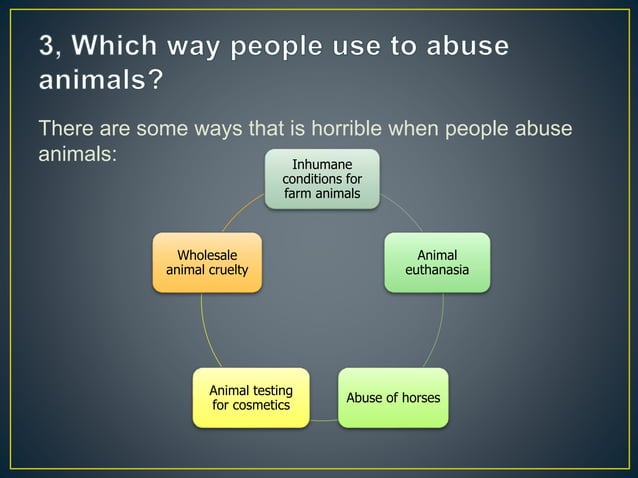Animal cruelty remains a pervasive issue in today’s society, a phenomenon that transcends geographical and cultural boundaries. When a loved one engages in harmful behavior towards animals, it presents a complex quandary for those who witness it. Responses to such situations must be approached with care, empathy, and an acute understanding of the psychological underpinnings that may lead individuals to mistreat animals. Recognizing that these behaviors often stem from deeper emotional or social deficits is crucial. This analysis seeks to provide a comprehensive guide on how to address such alarming behaviors while fostering a constructive dialogue.
First and foremost, it is crucial to approach the situation with a level of sensitivity. A loved one may not fully grasp the implications of their actions. It is tempting to react with outrage or condemnation, but such responses can alienate them and inhibit meaningful dialogue. The initial step should involve observation—carefully noting instances of mistreated animals and the contexts in which these actions occur. This meticulous observation will equip you with concrete examples to discuss later.
Next, consider the environment surrounding the situation. The influence of external factors—be it stress, mental health struggles, or societal conditioning—often plays a substantial role in one’s treatment of animals. For instance, individuals who have experienced trauma or who are living in a high-stress environment might project their frustrations onto the vulnerable beings around them. Recognizing these underlying issues allows for a more empathetic framework from which to approach your loved one.
When you decide to confront your loved one, choose an appropriate time and setting. An intimate setting, free from external distractions, is ideal for difficult conversations. Begin by expressing your concerns gently; use “I” statements to frame the conversation. For instance, saying “I feel troubled when I observe how animals are treated” avoids accusatory language, which can lead to defensiveness.
After establishing an emotional connection, delve deeper into the conversation. It is essential to ask open-ended questions that promote introspection. Phrasing such as “What do you think about the well-being of animals?” encourages reflection rather than eliciting a defensive response. This technique not only allows your loved one to express their viewpoint, but you may also uncover misperceptions or ignorance that can be addressed collaboratively.
Educating your loved one about animal welfare is paramount. Many individuals harbor misconceptions about the needs and emotions of animals. Present statistics, case studies, or literature that illustrate the suffering caused by neglect or abuse. Utilize compelling personal narratives or documentaries that explore animal suffering and rehabilitation. This revelations might foster a deeper understanding and empathy within your loved one.
Additionally, explore the psychological aspects of animal mistreatment together, delving into the motivations behind their behaviors. Engage in discussions about societal norms and how they shape perceptions of animal value. By highlighting the psychological framework, you can encourage a more nuanced understanding of the issue, potentially catalyzing a change in perspective.
Encouraging engagement with animal welfare organizations can also facilitate positive behavioral change. Suggest volunteering together at a local shelter or participating in community events that promote animal adoption and care. Such experiences not only educate but also immerse your loved one in compassionate contexts, allowing them to build connections with animals in need. Practical involvement can often illuminate the profound bond that exists between humans and animals, transforming apathy into advocacy.
Do not ignore the potential for resistance to change. Behavioral patterns can be deeply entrenched, and altering them takes time. Should your loved one remain unyielding, it may become necessary to establish boundaries. Your love for animals may require you to step back from relationships that disregard their welfare. This can be a difficult decision but vital for your own mental and emotional health.
In some cases, professional intervention may be required. If your loved one exhibits persistent abusive tendencies toward animals, and particularly if they display violent behaviors in general, it might be necessary to seek help from a mental health professional. Encourage them to consider counseling, emphasizing that addressing mental health is a strength, not a weakness. A trained professional can provide insights and tools that can foster healthier attitudes toward animals.
Throughout this journey, it is key to model the behaviors you wish to see. Communicate your own values concerning animals clearly and consistently, demonstrating kindness, respect, and advocacy. Often, actions can speak louder than words. By embodying compassion, you may over time inspire changes in their behavior as well.
Ultimately, addressing animal mistreatment within personal relationships is fraught with challenges yet imbued with significant potential for growth. By striking a balance between empathy and accountability, you can create a constructive dialogue that leads to a deeper understanding of animal welfare. Fostering a relationship where constructive feedback is appreciated can transform perceptions. Through patience, compassion, and unwavering commitment, change is a formidable possibility. With dedication, it is feasible to cultivate a world where respect for all living beings transforms not only individual relationships but society as a whole.








